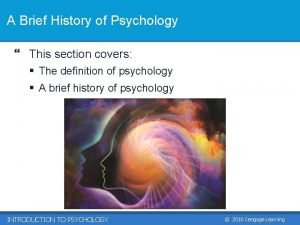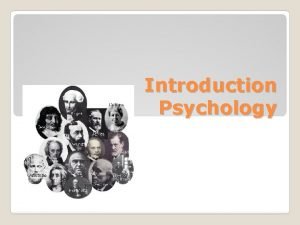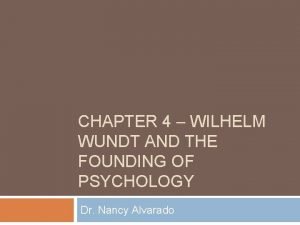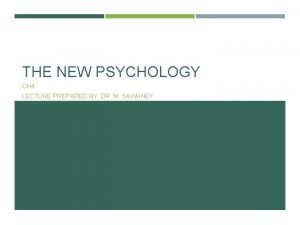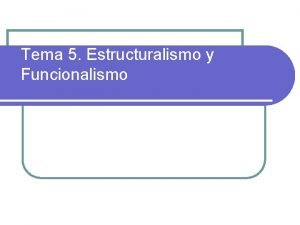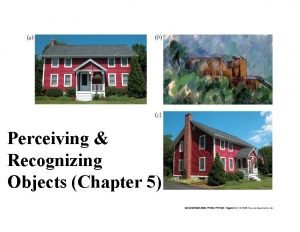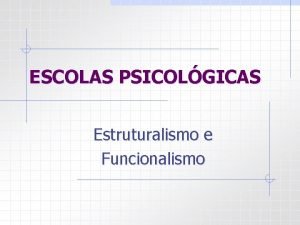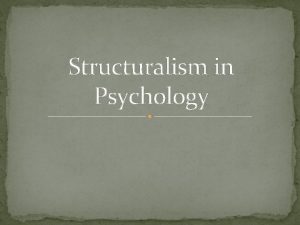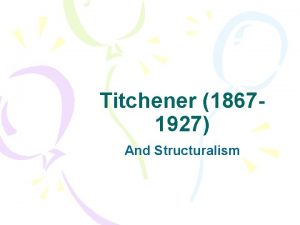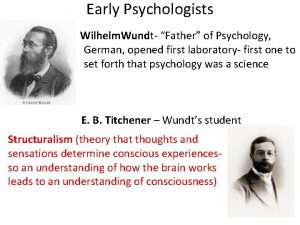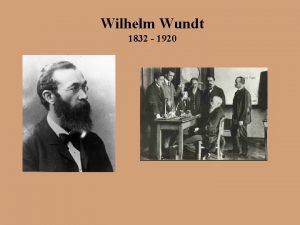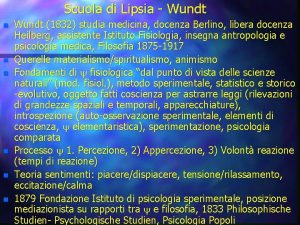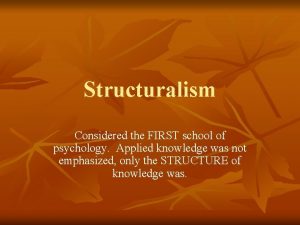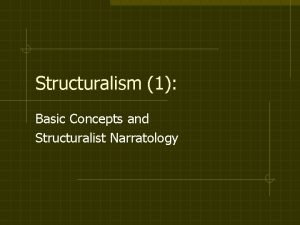Wilhelm Wundt Structuralism Considered father of psychology Founder










- Slides: 10

Wilhelm Wundt Structuralism Considered “father” of psychology Founder of modern psychology Opened a laboratory (Leipzig, Germany ) devoted exclusively to psychological experiments. show that psychology could be a valid experimental science Introspection training people to carefully and objectively as possible analyze the content of their own thoughts. E. B. Titchener was a student and founder of Structuralism First prominent system for organizing psychological beliefs

Sigmund Freud Psychoanalytic Founder of the psychoanalytic perspective Founder - the Id, Ego and Superego (personality) Contemporary version is called psychodynamic perspective) Believed that abnormal behavior originated from unconscious drives and conflicts Differed two ways from other perspectives Focused on abnormal behavior Relied on personal observation and reflections

William James Functionalism First American psychologist and author of the first psychology textbook. Often called the father of American psychology James-Lange theory of emotion suggests that emotions occur as a result of physiological reactions to events.

B. F. Skinner Behaviorist American psychologist focused on the role of responses to learning Best known for operant conditioning Behaviors were dependent upon what happens after the response Schedules of reinforcement are an important component of the learning process. When and how often we reinforce a behavior can have a dramatic impact on the strength and rate of the response. Skinner Box - rat learns to obtain food by pressing a lever.

John B. Watson Behaviorism Founder of Behaviorism The Little Albert Experiment Watson’s work made psychology more objective and scientific in its methods.

Carl Rogers Humanism Best-known for his nondirective approach to treatment known as clientcentered therapy Emphasized conscious experience as the proper focus of psychology

Ivan Pavlov Behaviorist Classical Conditioning Pavlov’s Dogs Fueled a move in psychology toward interest in observable behavior and away from the selfexamination of inner ideas and experiences

Erikson's stages of psychosocial development Hopes: Trust vs. Mistrust (Oral-sensory, Birth-2 years) Will: Autonomy vs. Shame & Doubt ( 2 -4 years) Purpose: Initiative vs. Guilt ( Preschool, 4 -5 years) Competence: Industry vs. Inferiority ( 5 -12 years) Fidelity: Identity vs. Role Confusion (Adolescence, 13 -19 years) Love: Intimacy vs. Isolation (Young adulthood, 2024, or 20 -39 years) Care: Generativity vs. Stagnation (Middle adulthood, 25 -64, or 40 -64 years) Wisdom: Ego Integrity vs. Despair (Late adulthood, 65 -death)

Lawrence Kohlberg (1927 -1987) Stages of Moral Development 1. Preconventional Moral Reasoning 2. Conventional Moral Reasoning 3. Postconventional Moral Reasoning

Jean Piaget Stages of Cognitive Develpomant Sensorimotor stage: from birth to age two Preoperational stage: starts when the child begins to learn to speak at age two and lasts up until the age of seven Concrete operational stage: from ages seven to eleven. Formal operational stage: from age eleven to sixteen and onwards
